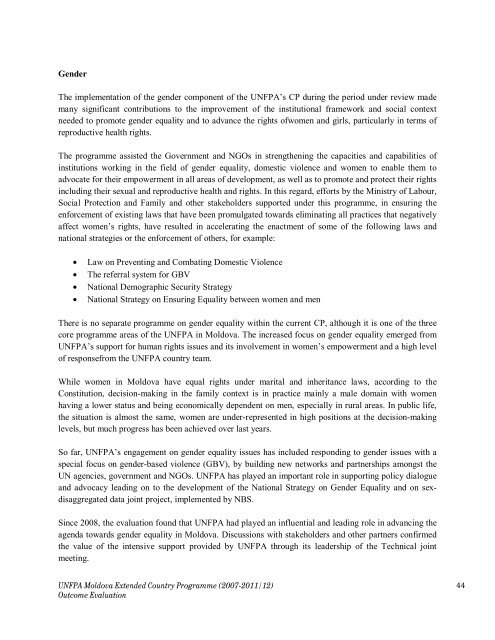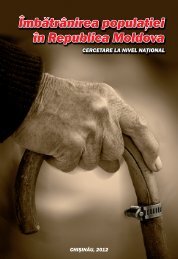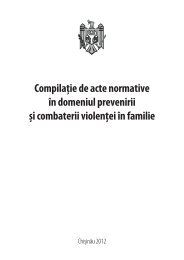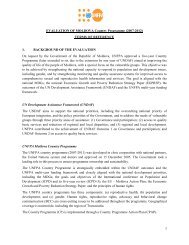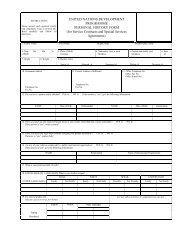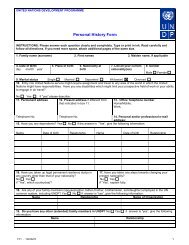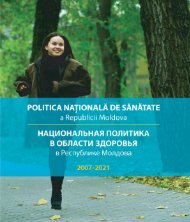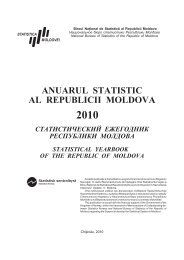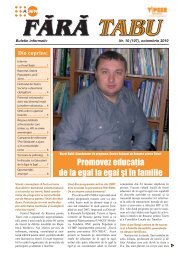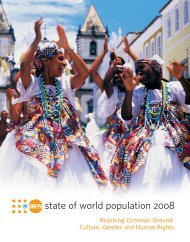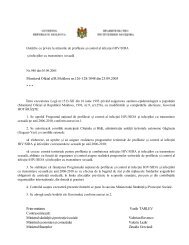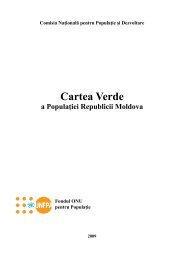Country Programme (2007-2011/2012) evaluation - UNFPA Moldova
Country Programme (2007-2011/2012) evaluation - UNFPA Moldova
Country Programme (2007-2011/2012) evaluation - UNFPA Moldova
Create successful ePaper yourself
Turn your PDF publications into a flip-book with our unique Google optimized e-Paper software.
Gender<br />
The implementation of the gender component of the <strong>UNFPA</strong>’s CP during the period under review made<br />
many significant contributions to the improvement of the institutional framework and social context<br />
needed to promote gender equality and to advance the rights ofwomen and girls, particularly in terms of<br />
reproductive health rights.<br />
The programme assisted the Government and NGOs in strengthening the capacities and capabilities of<br />
institutions working in the field of gender equality, domestic violence and women to enable them to<br />
advocate for their empowerment in all areas of development, as well as to promote and protect their rights<br />
including their sexual and reproductive health and rights. In this regard, efforts by the Ministry of Labour,<br />
Social Protection and Family and other stakeholders supported under this programme, in ensuring the<br />
enforcement of existing laws that have been promulgated towards eliminating all practices that negatively<br />
affect women’s rights, have resulted in accelerating the enactment of some of the following laws and<br />
national strategies or the enforcement of others, for example:<br />
• Law on Preventing and Combating Domestic Violence<br />
• The referral system for GBV<br />
• National Demographic Security Strategy<br />
• National Strategy on Ensuring Equality between women and men<br />
There is no separate programme on gender equality within the current CP, although it is one of the three<br />
core programme areas of the <strong>UNFPA</strong> in <strong>Moldova</strong>. The increased focus on gender equality emerged from<br />
<strong>UNFPA</strong>’s support for human rights issues and its involvement in women’s empowerment and a high level<br />
of responsefrom the <strong>UNFPA</strong> country team.<br />
While women in <strong>Moldova</strong> have equal rights under marital and inheritance laws, according to the<br />
Constitution, decision-making in the family context is in practice mainly a male domain with women<br />
having a lower status and being economically dependent on men, especially in rural areas. In public life,<br />
the situation is almost the same, women are under-represented in high positions at the decision-making<br />
levels, but much progress has been achieved over last years.<br />
So far, <strong>UNFPA</strong>’s engagement on gender equality issues has included responding to gender issues with a<br />
special focus on gender-based violence (GBV), by building new networks and partnerships amongst the<br />
UN agencies, government and NGOs. <strong>UNFPA</strong> has played an important role in supporting policy dialogue<br />
and advocacy leading on to the development of the National Strategy on Gender Equality and on sexdisaggregated<br />
data joint project, implemented by NBS.<br />
Since 2008, the <strong>evaluation</strong> found that <strong>UNFPA</strong> had played an influential and leading role in advancing the<br />
agenda towards gender equality in <strong>Moldova</strong>. Discussions with stakeholders and other partners confirmed<br />
the value of the intensive support provided by <strong>UNFPA</strong> through its leadership of the Technical joint<br />
meeting.<br />
<strong>UNFPA</strong> <strong>Moldova</strong> Extended <strong>Country</strong> <strong>Programme</strong> (<strong>2007</strong>-<strong>2011</strong>/12)<br />
Outcome Evaluation<br />
44


